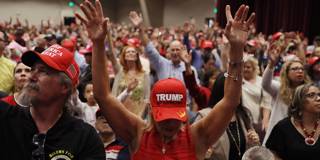It is unsettling to hear people at the top of the US government speak about politics in terms that rightly belong in church. They are challenging the founding principles of the American Republic, and they might actually win as a result.
NEW YORK – Charles Carroll of Carrollton, Maryland was the only Roman Catholic to sign the Declaration of Independence in 1776. Although one of the Founding Fathers, as a Catholic Carroll was not allowed to hold public office. This changed only in 1789, when the Constitution prevented Congress from establishing any religion, and religious affiliation ceased to be a test for those seeking public office.

NEW YORK – Charles Carroll of Carrollton, Maryland was the only Roman Catholic to sign the Declaration of Independence in 1776. Although one of the Founding Fathers, as a Catholic Carroll was not allowed to hold public office. This changed only in 1789, when the Constitution prevented Congress from establishing any religion, and religious affiliation ceased to be a test for those seeking public office.